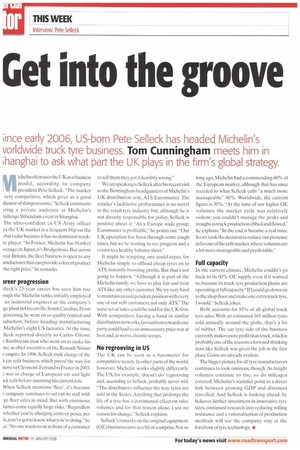Get into the groove
Page 16

If you've noticed an error in this article please click here to report it so we can fix it.
;ince early 2006, US-born Pete Selleck has headed Michelin's vorldwide truck tyre business. Tom Cunningham meets him in ;hanghai to ask what part the UK plays in the firm's global strategy.
VIichelin often uses the UK as a business model, according to company president Pete Selleck. "The market very competitive, which gives us a good dicator of things to come," Selleck comments aring a private audience at Michelin's Itallenge Bibendum event in Shanghai.
The ultra-confident ex-US Army officer ys the UK market is a frequent blip on the Dbal radar because it has no dominant truckre player. "In France, Michelin has blanket iverage; in Japan, it's Bridgestone. But across rent Britain, the fleet business is open to any a nufacturer that can provide a decent product the right price," he remarks.
areer progression :neck's 25-year career has seen him rise ough the Michelin ranks, initially employed an industrial engineer at the company's ige plant in Greenville,South Carolina. From .gineering, he went on to quality control and oduction. before heading manufacturing Michelin's eight US factories. At the time, lleck reported directly to Carlos Cihosn, a flamboyant man who went on to make his me as chief executive of the Renault Nissan r empire. In 1996, Selleck took charge of the 3 car refit business, which paved the way for nave to Clermont-Ferrand in France in 2003. a was in charge of European car and light ick refit before assuming his current role. When Selleck mentions 'fleet', it's because a company continues to set out its stall with -ge fleet sales in mind. But with enormous lumes come equally large risks."Regardless whether you're charging cents or pence per le,you've got to know what you're doing," he s. "No one wants to sit in front of a customer to tell them they got it horribly wrong."
We are speaking to Selleck after his recent visit to the Birmingham headquarters of Michelin's UK distribution arm, ATS Euromaster. The retailer's lacklustre performance is no secret in the retail tyre industry but, although he is not directly responsible for policy. Selleck is positive about it: "As a Europe-wide group, Euromaster is profitable," he points out. "Our UK operation has been through some tough times, but we're starting to see progress and a return to a healthy balance sheet."
It might be tempting, one could argue, for Michelin simply to offload cheap tyres on to ATS, instantly boosting profits. But that's not going to happen. "Although it is part of the Michelin family, we have to play fair and treat ATS like any other customer. We try very hard to maintain an independent position with every one of our refit customers, not only ATS." The same set of rules could be said for the UK firm. With competitors having a hand in similar distribution networks, favouritism towards one party could lead to an unnecessary price war at best and, at worst, ch aoti c scenes.
No regrooving in US The UK can be seen as a barometer for competitive trends. In other parts of the world, however, Michelin works slightly differently. The US, for example. 'doesn't do' regrooving and, according to Selleck, probably never will. "The distributors influence the way tyres are sold in the States. Anything that prolongs the life of a tyre has a detrimental effect on sales volumes and for that reason alone, I see no reason for change," Selleck explains.
Selleck's remarks on the original equipment (OE) business came as a bit of a surprise. Not so long ago, Michelin had a commanding 60% of the European market, although that has since receded to what Selleck calls "a much more manageable" 40%. Worldwide, the current figure is 30°/0. "At the time of our higher OE volumes, the market cycle was relatively violent; you couldn't manage the peaks and troughs as truck production ebbed and flowed," he explains. "In the end, it became a real issue. So we took the decision to reduce our presence in favour of the refit market, where volumes are a lot more manageable and predictable."
Full capacity In the current climate, Michelin couldn't go back to its 60% OE supply even if it wanted to, because its truck tyre production plants are operating at full capacity."If I could go down on to the shop floor and make one extra truck tyre, I would," Selleck jokes.
Refit accounts for 85% of all global truck tyre sales. With an estimated 165 million tyres sold annually around the globe, that's a lot of rubber. The car tyre side of the business currently makes more profit than truck, which is probably one of the reasons a forward-thinking man like Selleck was given the job in the first place. Gains are already evident.
The bigger picture for all tyre manufacturers continues to look ominous, though. As freight volumes continue to rise, so do mileages covered. Michelin's statistics point to a direct link between growing GDP and distances travelled. And Selleck is looking ahead: he believes further investment in innovative tyre sizes, continued research into reducing rolling resistance and a rationalisation of production methods will see the company stay at the forefront of tyre technology. •
































































































































































